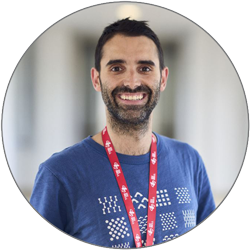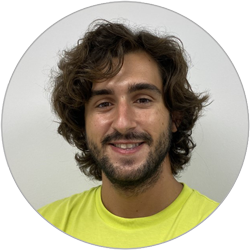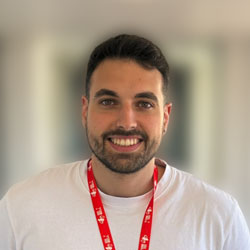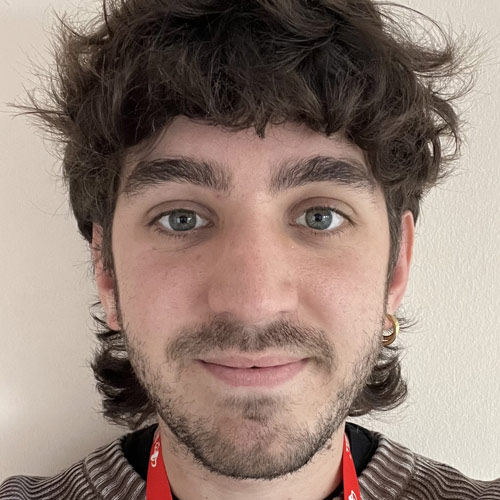Giorgetti Group
Identification of Molecular and Cellular Pathways involved in hematopoietic stem cell specification and oncogenic transformation

Lab Focus-Elucidating molecular and cellular mechanism regulating hematopoietic development
Why it matters
Keywords
Publications
Pera J, Romero-Moya D, Torralba-Sales E, Andersson R, García-Hernández V, Magallon-Mosella M, Distefano M, Berenguer Balaguer C, Castaño J, De Giorgio F, Qiu Z, Iglesias A, Spurk P, Montserrat-Vazquez S, Pasquali L, Liang Z, Català A, Florian MC, Wlodarski MW, Bigas A, Marin-Bejar O, Giorgetti A. Human iPSCs-based modeling unveils SETBP1 as a driver of chromatin rewiring in GATA2 deficiency. Nat Commun. 2025 Nov 17;16(1):10035.
Romero-Moya D, Torralba-Sales E, Calvo C, Marin-Bejar O, Magallon-Mosella M, Distefano M, Pera J, Castaño J, De Giorgio F, Gonzalez J, Iglesias A, Berenguer-Balaguer C, Schilling M, Plass M, Pasquali L, Català A, Molina O, Wlodarski MW, Bigas A, Giorgetti A. CRISPR-engineered human GATA2 deficiency model uncovers mitotic dysfunction and premature aging in HSPCs, impairing hematopoietic fitness. Leukemia. 2025 Sep 15.
Kotmayer L, Kozyra EJ, Kang G, Strahm B, Yoshimi A, Sahoo SS, Pastor VB, Attardi E, Voss R, Vinci L, Kaiser M, Dworzak MN, De Moerloose B, Sukova M, Starý J, Hasle H, Jahnukainen K, Polychronopoulou S, Kállay K, Smith OP, Malone A, Barzilai Birenboim S, Masetti R, Buechner J, Ussowicz M, Kjöllerström P, Bodova I, Kavcic M, Català A, Turkiewicz D, Schmugge M, de Haas V, Okhomina VI, Sotomayor C, Catalán P, Wehr C, Salzer U, Germing U, Gattermann N, Bödör C, Gray N, Lewis S, Shimamura A, Giorgetti A, Erlacher M, Niemeyer CM, Wlodarski MW. Age-dependent phenotypic and molecular evolution of pediatric MDS arising from GATA2 deficiency. Blood Cancer J. 2025 Jul 15;15(1):121.
Romero-Moya D, Pera J, Marin-Bejar O, Torralba-Sales E, Murillo-Sanjuán L, Diaz-de-Heredia C, Montoro J, Rodríguez-Ubreva J, Liquori A, Cervera J, Wlodarski MW, Català A, Giorgetti A. Multiple phenotypes and epigenetic profiles in a three-generation family history with GATA2 deficiency. Leukemia. 2025 Apr;39(4):962-966.
Marin-Bejar O, Romero-Moya D, Rodriguez-Ubreva J, Distefano M, Lessi F, Aretini P, Liquori A, Castaño J, Kozyra E, Kotmayer L, Bueno C, Cervera J, Rodriguez-Gallego JC, Nomdedeu JF, Murillo-Sanjuán L, De Heredia CD, Pérez-Martinez A, López-Cadenas F, Martínez-Laperche C, Dorado-Herrero N, Marco FM, Prósper F, Menendez P, Valcárcel D, Ballestar E, Bödör C, Bigas A, Catalá A, Wlodarski MW, Giorgetti A. Epigenome profiling reveals aberrant DNA methylation signature in GATA2 deficiency. Haematologica. 2023 Sep 1;108(9):2551-2557.
Bigas A, Galán Palma L, Kartha GM, Giorgetti A. Using Pluripotent Stem Cells to Understand Normal and Leukemic Hematopoietic Development. Stem Cells Transl Med. 2022 Nov 18;11(11):1123-1134.
Kotmayer L, Romero-Moya D, Marin-Bejar O, Kozyra E, Català A, Bigas A, Wlodarski MW, Bödör C, Giorgetti A. GATA2 deficiency and MDS/AML: Experimental strategies for disease modelling and future therapeutic prospects. Br J Haematol. 2022 Nov;199(4):482-495.
Fernández-Muñoz B, Rosell-Valle C, Ferrari D, Alba-Amador J, Montiel MÁ, Campos-Cuerva R, Lopez-Navas L, Muñoz-Escalona M, Martín-López M, Profico DC, Blanco MF, Giorgetti A, González-Muñoz E, Márquez-Rivas J, Sanchez-Pernaute R. Retrieval of germinal zone neural stem cells from the cerebrospinal fluid of premature infants with intraventricular hemorrhage. Stem Cells Transl Med. (2020). Online ahead of print.
Castaño J, Aranda S, Bueno C, Calero-Nieto FJ, Mejia-Ramirez E, Blanco E, Wang X, Prieto C, Zabaleta L, Rovira M, Jiménez-Delgado S, Gӧttgens B, Di Croce L, Menendez P, Raya A and Giorgetti A. GATA2 directly represses cardiac fates to promote hematopoietic specification of human mesoderm. Stem Cell Reports, 13:515-529. (2019).







